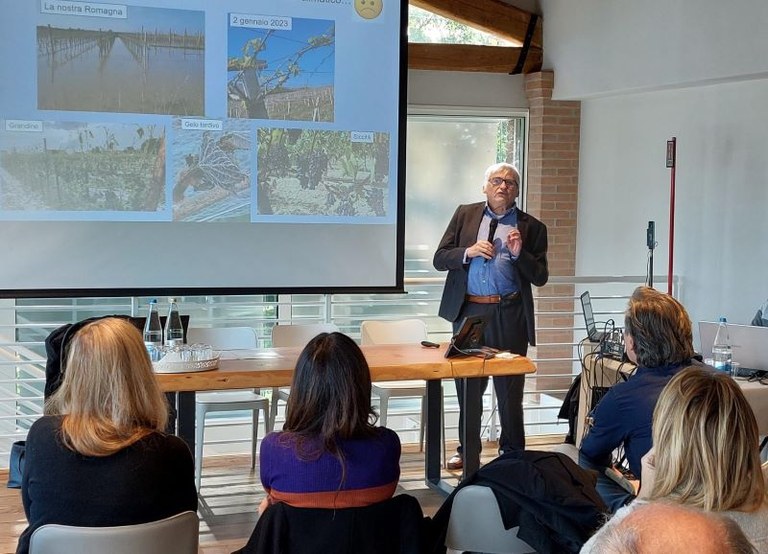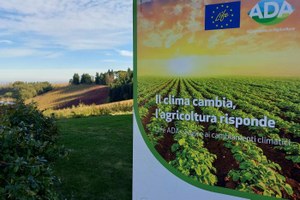Third and final workshop of Life Ada project for the wine supply chain
The third and final workshop organized by the Region as part of Life Ada project (ADaptation in Agriculture), which is funded with Life programme of the European Commission, focused on an increasingly important sector for Emilia-Romagna such as the wine supply chain. growing one. By no coincidence the event took place last November 16th in the Masselina estate, 22 hectares of vineyards on the hills near Castelbolognese (RA).
President Nannetti from Terre Cevico during the welcome speech recalled the dramatic impact of events linked to climate change, such as the tornado which caused extensive damage in Ravenna area in July 2023, ending with almost 100 hectares of eradicated vineyards. All the available tools need to be put in place, from genetic improvement to obtain resistant varieties to investments in innovation, which must be sustainable both from the environmental and the economic point of view for producers.
Dr. Felice for the Region highlighted the dual role of agriculture: on the one hand it has to mitigate its impact, due to the important contribution to CO2 emissions especially from the livestock sector; on the other hand, to adjust to climate changes with active and passive defense tools such as insurance, mutual funds and other income stabilization tools.
S. Poni, full professor of Viticulture at the Catholic University of Piacenza, emphasized the most urgent issues in the sector: adaptation, mitigation and defense; genetic improvement; soil management; the need to introduce new technologies, whose applicability in viticulture is currently limited.
 In summary, the increasing average temperatures and heat waves lead to significant stress in the vineyards with lower yields: the response to that is bringing forward grape harvest but not only that, in fact biodiversity and the use of native varieties can help, as well as a rational management of water resources.
In summary, the increasing average temperatures and heat waves lead to significant stress in the vineyards with lower yields: the response to that is bringing forward grape harvest but not only that, in fact biodiversity and the use of native varieties can help, as well as a rational management of water resources.
Other threats to wine production are diseases such as flavescence dorée and botrytis: genetic selection of disease-tolerant vines can be a valid help against them; in any case, even about new technologies, a key driver for change for the producer is always linked to real improvements and to economic sustainability.
After the update on project status by the coordinator S. Faccioli from Unipol Sai, the young winemaker M. Morselli shared his experience about Ada Tool, the web application created in the project: it proved useful for irrigation, for scheduling treatments according to rainfall and temperature data, with a positive effect on the environment and on pesticide reduction.
During the round table with stakeholders, agronomists D. Rossi and G. Cavina reviewed the main problems in viticulture in our region: rainfall reduction, heat waves that cause sunburn in grapes, plus the biotic stress of insects and fungi that changed their cycle with climate changes. The challenge for wine producers at this point is improving sustainability and adaptation while maintaining profit margins, with the constant regional and European support on investments, natural disaster compensation and government subsidised policies.
The conclusions of the webinar were drawn by the representatives of regions with a strategic wine sector: N. Benatti for Emilia-Romagna, A. Andriolo for Veneto and G. Giliberti for Tuscany.
All of them agreed on the need for modernization in this sector, usually not very open to innovation, both with active defense tools and with specialized and competent professionals; the need to push more and more on the creation of mutual funds and to connect climate data between different regions.
Check the complete workshop program (412.96 KB).
Click to download the presentations:
- The wine supply chain: challenges and competitiveness (3.92 MB) (prof. S. Poni);
- Life ADA project: implementation status and future objectives (1.07 MB) (S. Faccioli);

